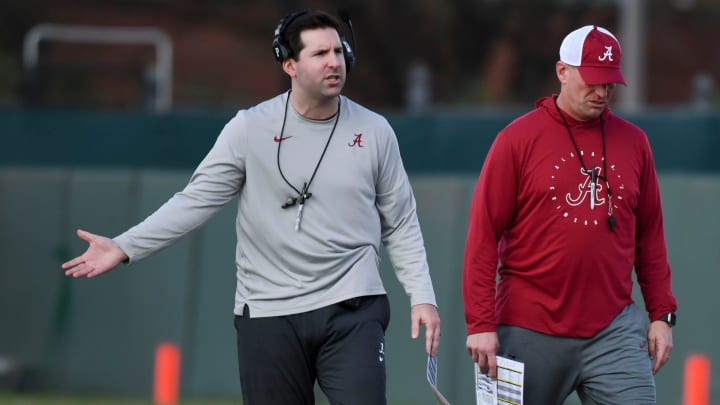Alabama Football Still Experimenting with Tempo, Strategy of In-Helmet Communicators

The Alabama football team kicks off against Western Kentucky in 17 days on Saban Field at Bryant-Denny Stadium. While most of the attention in Tuscaloosa has been at the micro level this offseason, focusing on the changes the Crimson Tide program itself is facing, there are several macro level changes occurring in college football to prepare for as well.
Most are aware of the expanded College Football Playoff and the new opportunities that it brings. The death of the Pac-12 has been widely publicized as college football now has a Power 4 featuring two superpower conferences in the SEC and BIG 10. College football fans will even quickly pick up on a procedural change at the end of each half and game with the inception of the two-minute warning. However, the biggest change to college football may be something much more subtle.
Savvy college football fans will notice a green dot on the helmets of two prominent players this season. Most teams will designate the quarterback offensively and a linebacker defensively, but any single player can wear the green sticker indicating their helmet is live to receive direct communication from the coaching staff on the sideline before the play.
Alabama along with the rest of the college football world got to practice with the new technology during spring but at the end of the month it goes live in a real game for the first time.
'It has its challenges. Once we get into the stadium and it's 100,000 fans it can be challenging. I don't think ya'll are making it into a big deal. It is a big deal because if we're not all on the same page that could be a touchdown, explosive play," said Alabama linebacker Deontae Lawson when asked if the change was getting too much attention.
The helmet communication allows coordinators to be a bit more hands on when spotting schematic advantages but also adds another layer of strategy for coaches who like to manipulate tempo. Will teams abandon the traditional method of signaling plays in from the sidelines? Will teams use the communicators strictly for adjustments or audibles?
“You could write a book on the headset communication and how different it is from where we were with signaling to where we are now. I think you’re going to see all things over the spectrum," said Alabama defensive coordinator Kane Wommack on Tuesday. "I think you’re going to see some people that still do all the signaling and some who go exclusively to the headset communication. I think there’s a fine line there because it cuts off at 15 seconds, so what happens afterwards when an offense is going to make a check. You’re going to see some offenses that goes really fast. I think that’s going to be helpful to us on defense because I can immediately get a call to the core, and they can communicate to seven or eight guys immediately."
Crimson Tide offensive coordinator Nick Sheridan chose to keep his cards close to the vest on Wednesday when discussing the Alabama offensive philosophy on utilizing the new technology in relation to strategy and tempo.
"I think the mixing up of tempos is important. How each team, each opponent, what you feel benefits you. I think the pace of play has always been something that offense has utilized to try to create an advantage, whatever that may look like," said Sheridan "Going as fast as possible or as slow as possible, just to try to win the game and so, we’ll be ready to do whatever we feel is gonna help us win."
The Crimson Tide still has a week and a half of fall camp remaining before playing its first game of the 2024 season. Figuring out who's starting at right tackle will certainly be of paramount importance, but nailing down exactly how the staff will use the helmet communicators is just as important.
